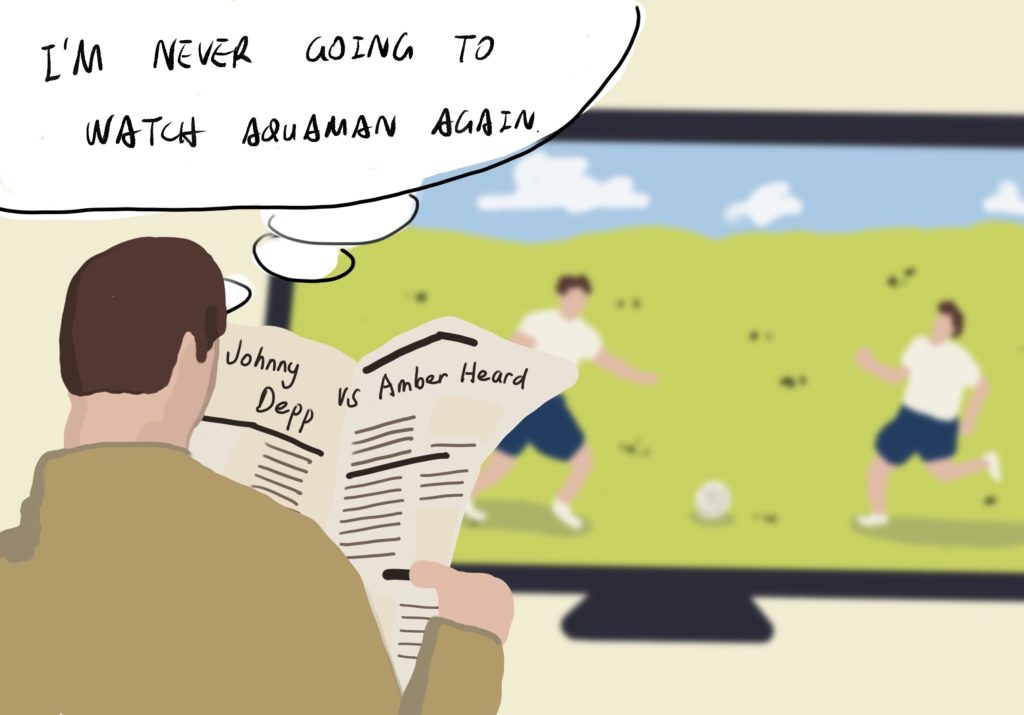For well over a week now, my social media feed has been packed full of content on the ongoing Amber Heard and Johnny Depp defamation trial. On one hand, this is exciting. Coverage of this trial reinvigorates conversations on domestic abuse and gender norms. But on the other hand, I can’t help but compare the discourse in this case to situations where the gender roles are reversed.
Before I even state my opinion, let me get one thing ultimately clear: I detest Amber Heard and think her actions towards Johnny Depp are deplorable in every sense of the word. Do not mistake this article as a way to excuse her.
Abuse is an extremely nuanced topic, especially in the context of a woman abusing a man. We are often willing to discredit the experiences of men due to our preconceived ideas of strength and relationship roles. When we expect men to be unfailingly strong, we don’t realize that they can also face abuse. That being said, women abusers are often faced with a heightened level of backlash because we use their actions as a way to generalize all survivors. Suddenly, she’s not just a terrible person who has done terrible things, but a means of discrediting an entire movement.
Amber Heard first accused Johnny Depp of abuse in 2018 in the heart of the MeToo movement. As a result, Depp lost movie roles and public favor. When it came to light that Heard’s allegations not only false but she actually perpetrated the abuse, public opinion quickly flipped.
Supporters of the MeToo movement were upset that Heard would exploit the real experiences of other women to try to garner public affection even when she was in the wrong. Those who did not support the movement now had justification for their disbelief. Amber Heard was suddenly proof that MeToo was a lie.
What frankly sucks above all else is that quite literally thousands of women can be vulnerable and brave and put so much work and mental energy into exposing their abusers, only to be discredited because of the few and far between false accusations. Women are not a monolith and should not be treated as such.
Trust me, as a woman who advocates for sexual assault awareness — largely from personal experience — nothing makes me more upset than when my work is discredited by another person’s actions. Allowing that anger to compound on Heard is not productive. Be upset at her for the proper reasons and be upset with those who use her case as a means for generalizing the experiences of all women.
Because domestic abuse cases in which a woman is the perpetrator are used to reflect on the credibility of every woman, the public backlash is often greater than that given to men abusers. If every abuse case from a public figure who is a man got the same level of media coverage as the Amber Heard case, we would never stop seeing trials.
For example, eighty NFL players have been charged with domestic abuse since 2000. How many of the eighty NFL players can you name? How many of their victims can you name?
Now I know that this is not a direct comparison. Johnny Depp, unlike many of those women, is a massive celebrity in his own right. But even celebrity women are afforded lesser coverage, character assassinations and continuous attempts to prove them false rather than the truly heartwarming outpour of support received by Depp.
Sandra Muller, the journalist who led the MeToo movement in France, faced a level of backlash that shows how women often come forward at the expense of the normalcy of their life as they know it.
“It hasn’t been good for me, for my image, for my work.” Muller says, “anytime abusers don’t get away with violating us without consequences, it will be called ‘bias’ or ‘lack of due process.’ Anytime we say what he did, making perpetrators look like who and what they are, it will be called ‘defamatory.’”
Michelle Williams, Emily Ratajkowski and Ashley Judd are a few among many of the celebrities who acted as figureheads for the MeToo movement and faced genuine detriment to their careers in the wake of coming forward. They were harassed about why they waited so long to speak, and every character flaw was exploited as a reason why they might have ‘deserved it.’
I firmly believe that if any of these women were alcoholics during the period of their abuse, as was Johnny Depp, they would have been discredited for it. Women are simply not afforded the same space to falter.
In short, if you will no longer watch Aquaman, but continue to watch the NFL, Woody Allen movies, Mario Batali cooking shows, David Blaine or David Copperfield magic shows, Jaws, or the Backstreet Boys you are acting hypocritically.
If you only care about victims who are men or pay more malice towards women perpetrators, you need to reevaluate why you care about this issue. If you care more about what Amber Heard has done because you are angry that it discredits the stories of other women, you are missing the point.
Again, Amber Heard’s actions need to be condemned. At the same time, we must hold all abusers to more uniform standards and provide universal support to survivors.

























































